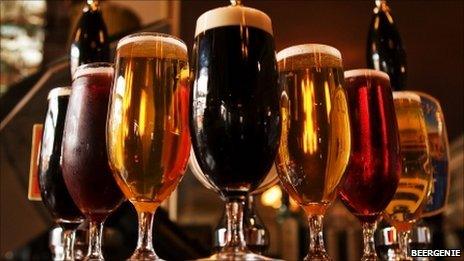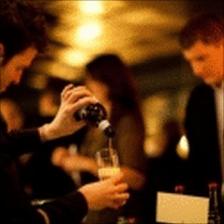Scottish pubs look to a brighter future
- Published

Scotland's pub closure rate appears to be slowing but industry figures expect more pain to come
Scotland's pub trade has found little reason to raise a glass in celebration in recent years.
The British Beer and Pub Association's most recent survey estimated three pubs went out of business every week in Scotland in 2010.
The sector has blamed soaring beer duty, the smoking ban and cut-price supermarket deals for the decline.
But evidence is emerging that could bring some cheer back to Scotland's estimated 5,000 pubs.
That same survey found the rate of decline had slowed significantly from the previous year - perhaps by as much as half.
And there are signs that commercial interest in pubs remains high, at least at the higher end of the market.
The first tranche of a portfolio of 122 Scottish pubs which was put on the market recently attracted a lot of interest, according to chartered surveyors DM Hall.
The properties historically were part of the Tennents estate, which passed into the hands of Spirit Group and subsequently the property tycoon Robert Tchenguiz.
The package of pubs included many successful, high-volume outlets, including city centre bars, community pubs and destination inns such as Glasgow bars the Griffin, the Park Bar, the Queen's Park Cafe and community pub La Cala in Dennistoun.
DM Hall, which carried out surveys on many of the properties, said interest was high and there was "a considerable number" of overlapping offers by the closing date earlier this month.
Alan Gordon, from DM Hall, said: "I think there is a general perception that the market as a whole is struggling but that is certainly not the case.
"There's good and bad in every industry and there are certainly public house businesses which will be struggling. But my experience is that those pubs which are presented well, have been refurbished to a good standard and are managed correctly continue to thrive."
But while high-end pubs may be performing relatively well, Mr Gordon said he remained concerned about properties at the other end of the scale.
He continued: "There is no doubt that a polarisation of the trade is still under way, with better units surviving and prospering and tumbleweed blowing around the bottom end of the spectrum.
"It is not too fatalistic to suggest that 15% to 20% of properties down the scale will end up trading as something else.
"Where I particularly fear for the market is in the former industrial heartlands - areas such as Lanarkshire, Ayrshire, Dunbartonshire and West Lothian - where formerly thriving communities are transforming into dormitory towns with a demographic which simply no longer fits the traditional pub model."
The British Beer and Pub Association believes that while the decline in the number of closures may have slowed, the story is far from over.
An association spokesman said: "There is still a significant loss in the number of pubs so we wouldn't say pub closures is an issue of the past."
The Scottish Licensed Trade Association (SLTA) also remains pessimistic about the future.
The trade organisation estimates 800 pubs have gone out of business since anti-smoking legislation was introduced in Scotland five years ago, and it is lobbying for a change in legislation which will allow some form of derogation from the ban.

There are concerns that banks are not lending even to well-established pubs
The SLTA is hopeful that minimum pricing on alcohol - which the new Scottish government has vowed to introduce in the current parliament - will help keep many pubs in business by cutting the price advantage currently enjoyed by the off-sales trade.
But it remains concerned about the overall picture.
Paul Waterson, from the SLTA, said: "The pub business is as difficult to trade in as I have ever seen.
"It is getting more and more difficult to keep them busy. I am not optimistic at the moment when you have as many pub closures. I don't see any end to it. It will take a long time to come out of it."
But some observers see the biggest problem as one of finance, particularly the lack of bank lending to the sector.
Scott Wright, editor of the Scottish Licensed Trade News, said while establishments might want to diversify into the food market and put on more in the way of entertainment to meet changing market demand, their hands were tied without adequate financial backing.
He added: "The accessibility of bank lending is a massive factor at the moment. It is difficult, even for established operators, to obtain money.
"There does seem to be an attitude from lending institutions towards pubs at the moment. I wouldn't use the word 'toxic' but there is a reluctance to lend to the trade."
But despite the tough times facing pubs, Mr Wright said there was much to praise about the sector.
"Sure there are some difficulties but we have got some fantastic pubs in Scotland, many of which are doing well," he added.
- Published5 June 2011
- Published13 March 2011
- Published8 September 2010